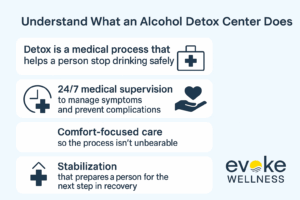When you see your adult child slipping deeper into alcohol use, the urge to act can be overwhelming. Your mind is already racing through worst-case scenarios, and your heart is breaking under the weight of worry. You want to help them—save them, even—but you know that pushing too hard could make them shut you out.
That tension—love tangled with fear—is something many parents in San Marcos carry. Talking to your adult child about an alcohol detox center may be one of the most difficult conversations you’ll ever have. But it can also be the first crack in the wall that addiction has built between you.
Step 1: Understand What an Alcohol Detox Center Does
Before you bring up the idea, it’s important that you understand what detox really means. Detox is not a punishment or a scare tactic—it’s a medical process that helps a person stop drinking safely. Alcohol withdrawal can be dangerous and, in some cases, life-threatening. A detox center provides:
- 24/7 medical supervision to manage symptoms and prevent complications
- Comfort-focused care so the process isn’t unbearable
- Stabilization that prepares a person for the next step in recovery
This step is often short—just a few days—but it’s a crucial foundation. Without it, your child may risk severe withdrawal symptoms like seizures or delirium tremens.
Step 2: Choose the Right Time to Talk
One of the most common mistakes parents make is bringing up treatment during a heated moment or when their child is intoxicated. It’s understandable—you’re scared, and the signs are right in front of you. But timing can determine whether your words reach them or bounce off.
Look for a moment when they’re relatively sober, calm, and not rushing out the door. It could be over coffee in the morning, during a quiet evening at home, or after they’ve shared frustration about something in their life.
Remember, this conversation isn’t a single event—it’s the start of an ongoing dialogue.
Step 3: Lead With Concern, Not Judgment
Your adult child is more likely to listen if they feel respected rather than cornered. Start by naming what you’ve observed and how it makes you feel. Avoid “you always” or “you never” statements—they sound like accusations.
Try something like:
“I’ve noticed you seem more tired lately, and I’ve seen you drinking more. I’m worried about you, and I want to talk about how to keep you safe.”
This kind of language communicates care while inviting them into the conversation.
Step 4: Explain Why Detox Is a First Step—Not the Whole Journey
Many people misunderstand detox. They might think it’s rehab, or they might fear it means losing control of their life. Explain clearly:
- Detox helps them safely stop drinking and stabilize physically.
- It’s usually short-term, often 3–7 days.
- It’s the first step before ongoing therapy and recovery work.
A parent in one of our San Marcos family sessions once told their son:
“Detox isn’t forever. It’s just getting you out of the storm so you can figure out where you want to go next.”
That framing can help reduce resistance.
Step 5: Offer Options Instead of Ultimatums
Ultimatums can sometimes work in life-or-death situations, but they often push adults further into defensiveness. Offering options can help your child feel they still have agency, even when you’re deeply concerned.
You might say:
“I’ve found a few programs here in San Marcos. We could call together, or I can just give you the numbers. You get to choose the one that feels right.”
This approach shifts the dynamic from parent–child to adult–adult, which can be crucial in maintaining respect.
Step 6: Be Ready for Resistance
Even if you choose your words carefully, your child may still reject the idea—sometimes angrily. This doesn’t mean you failed. Change is often a process of planting seeds, not forcing them to sprout.
If they refuse:
- Keep your boundaries consistent.
- Avoid endless debates or chasing them down with the same conversation every day.
- Let them know the door is always open.
This balance—holding space without losing yourself—is one of the hardest but most important parts of supporting an adult child in crisis.
Step 7: Know You’re Not Alone
It’s easy to feel like you’re the only parent going through this, but you’re not. Across San Marcos and beyond, parents are quietly navigating the same late-night fears and difficult talks.
Support groups like Al-Anon, family therapy, and educational programs can give you tools and emotional steadiness. Sometimes, the best thing you can do for your child’s recovery is strengthen your own.
FAQs About Talking to Your Adult Child About Detox
1. What if my child refuses to talk at all?
Don’t force it in the moment. Let them know you’re available when they’re ready, and then step back. Sometimes space can open a door that pressure keeps shut.
2. Should I bring up specific incidents when I talk to them?
Yes, but only as observations, not accusations. For example:
“Last week you missed work after drinking. That’s not like you, and it worries me.”
This grounds the conversation in facts rather than generalizations.
3. How do I handle my own emotions during the talk?
It’s natural to feel fear, anger, or sadness. If you can, process those feelings with a counselor or trusted friend first, so the conversation doesn’t become a release valve for your emotions.
4. What if they agree to detox but then back out?
This happens often. Don’t shame them—remind them that the offer still stands. Sometimes the second or third conversation is the one that sticks.
5. How do I choose the right alcohol detox center?
Look for:
- Medical supervision around the clock
- Experience with alcohol-specific withdrawal
- A plan for transitioning into ongoing care
- Family support services
Evoke Wellness Texas offers all of these in San Marcos, with a compassionate team who understands both the medical and emotional sides of detox.
6. Can detox alone keep my child sober?
No. Detox addresses the physical dependence, but without ongoing therapy and support, relapse risk remains high. Detox should always be followed by a structured treatment program.
Final Thought for Parents in Crisis
Approaching your adult child about detox isn’t about winning an argument—it’s about opening a door. You can’t make them walk through it, but you can make sure they know it’s there, waiting, whenever they’re ready.
Call (888)450-2285 or visit our alcohol detox center services in San Marcos, Texas to learn more about safe detox and supportive next steps for your loved one.



